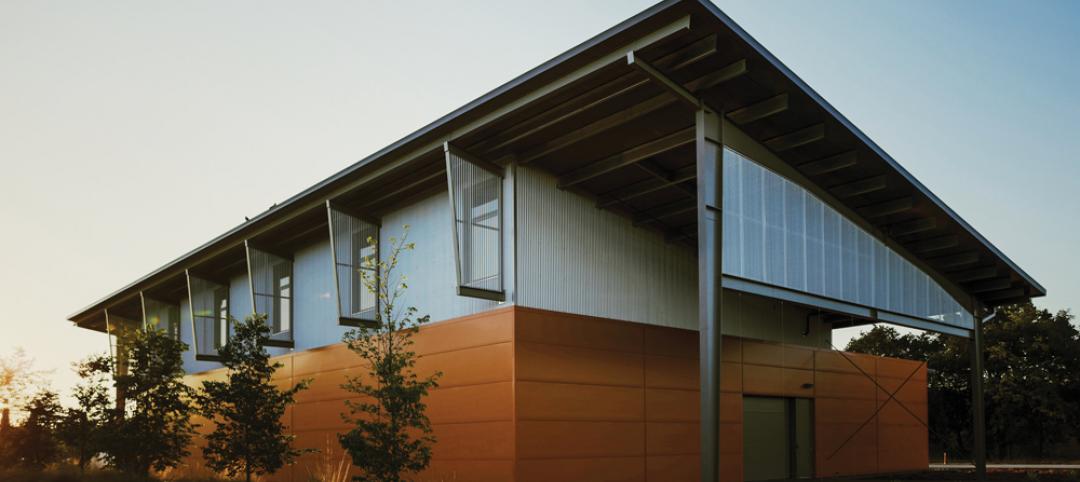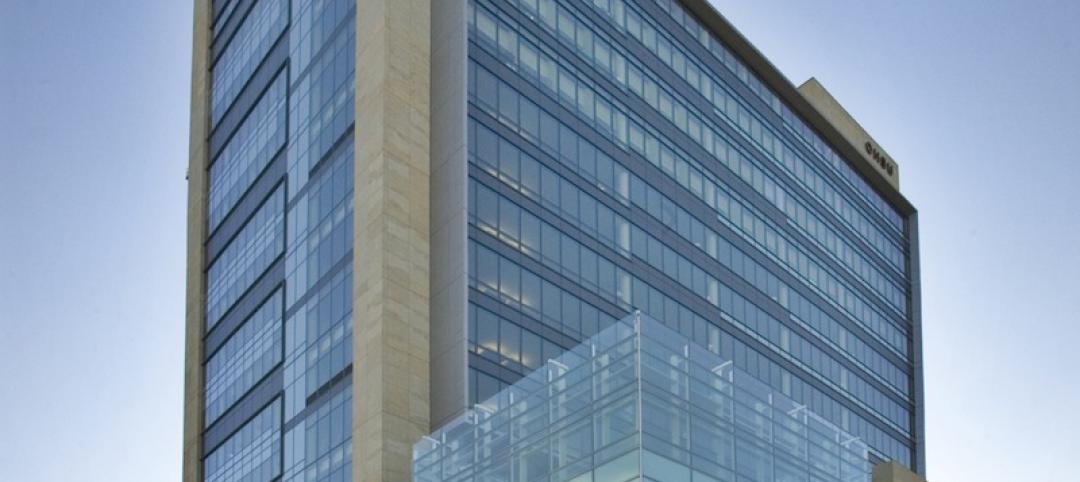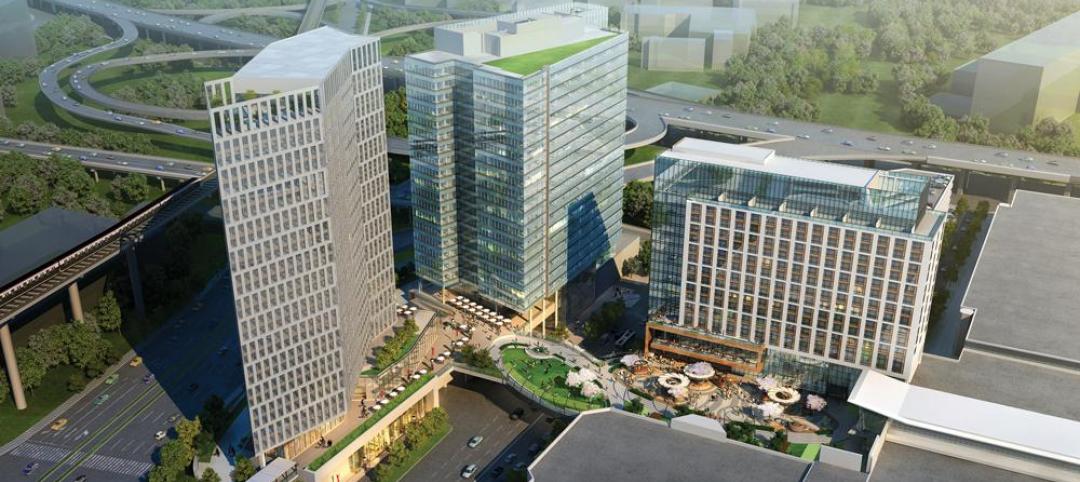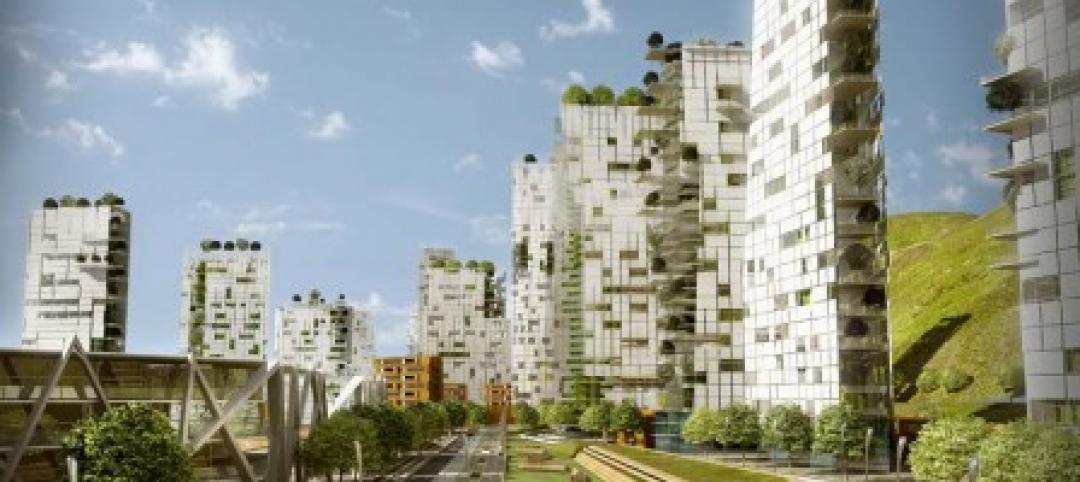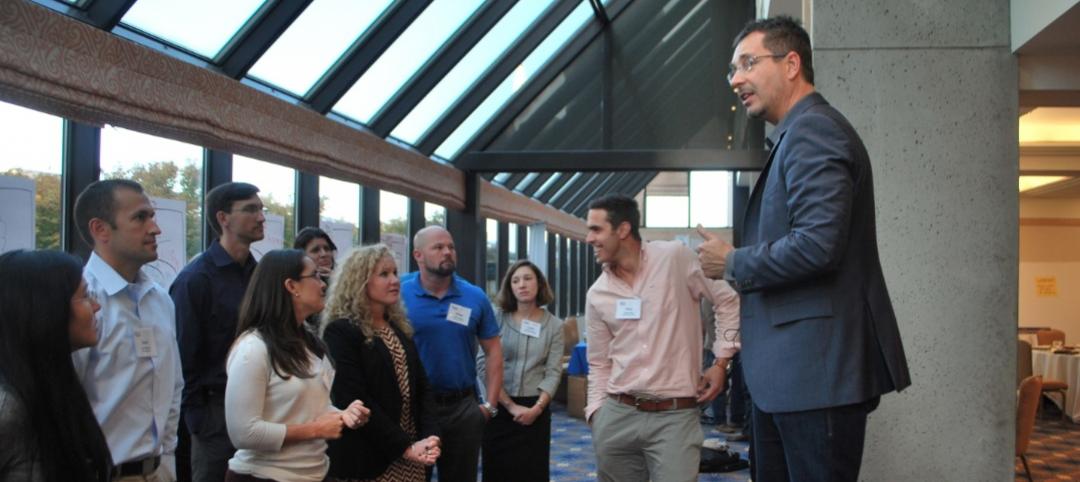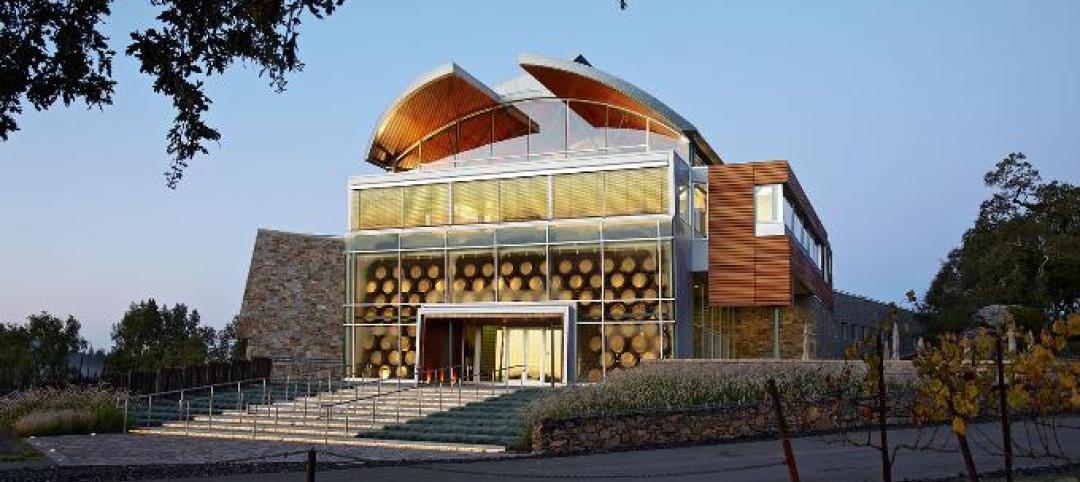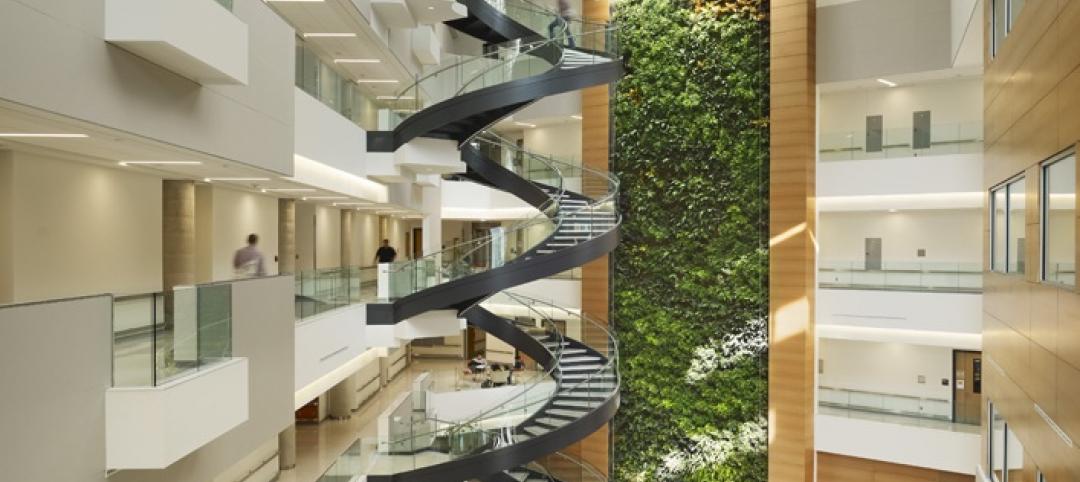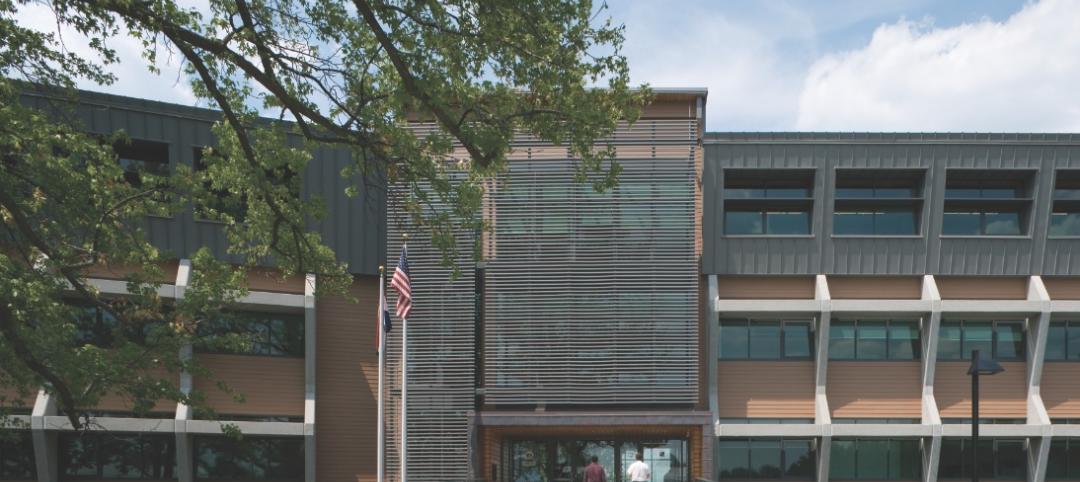The 1,900-acre Port San Antonio campus, immediately south of the country’s seventh-largest city’s downtown, is home to over 80 public- and private-sector companies and 13,000-plus workers in such fields as aerospace, defense, cybersecurity, robotics, and advanced manufacturing. The campus’ annual economic impact exceeds $5 billion.
In 2015, the Port—located at the former Kelly Air Force Base, which closed in 2001—revealed plans to focus its economic development on the goal of creating 5,000 new jobs by 2020. On February 27, the Port’s Board of Directors authorized its CEO Jim Perschback to negotiate development plans with American Triple I Partners to advance its strategic objectives.
The goal is to “leverage our Port’s unique platform and partnerships to physically and virtually connect the region’s large and well-established nature industries with the region’s innovators, and facilitate commerce and collaboration between then—leading to the development of new technologies that also have applications on a national and global scale and, as a result, drive regional economic growth,” reads the “Tech Port San Antonio” proposal that Port San Antonio presented last month.
The initial phases of the predevelopment agreement would support recent expansions by a growing number of cybersecurity firms moving onto the Port’s campus.
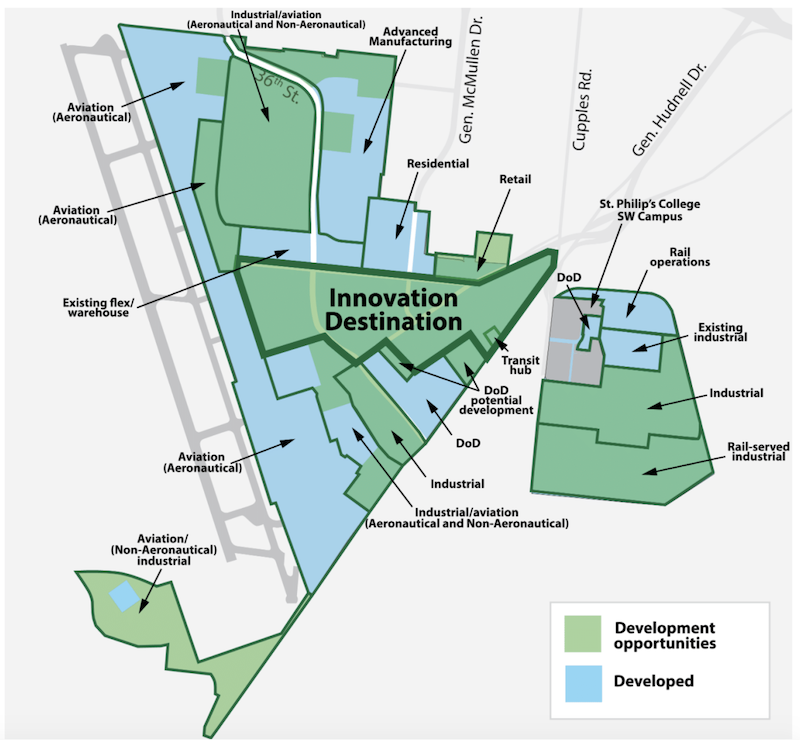
Port San Antonio would convert and enlarge a 130,000-sf industrial facility on its campus for an innovation center and office space for cybersecurity and defense tenants. It would also like to add a space for industrial fabrication. Image: Port San Antonio
The Port is considering a fitout of an existing flexible 130,000-sf industrial facility for an Interim Innovation Showroom and Education Center. The building—which could be expanded to 200,000 sf with the addition of a second floor—would include on its first floor a 36,000-sf 1,500-seat-capacity Technology Arena, a 49,000-sf expansion of the San Antonio Museum of Science and Technology, a 30,000-sf Industry Showroom, and 42,000 sf of coworking and maker spaces.
The predevelopment agreement also envisions150,000-sf of cybersecurity offices for a Security Operations Center, and shared/rentable space for commercial and defense operations, built to meet Sensitive Compartmented Information Facilities (SCIF) standards.
The first building of the complex is already nearly fully leased by cybersecurity company tenants such as CNF Technologies and Lockheed Martin
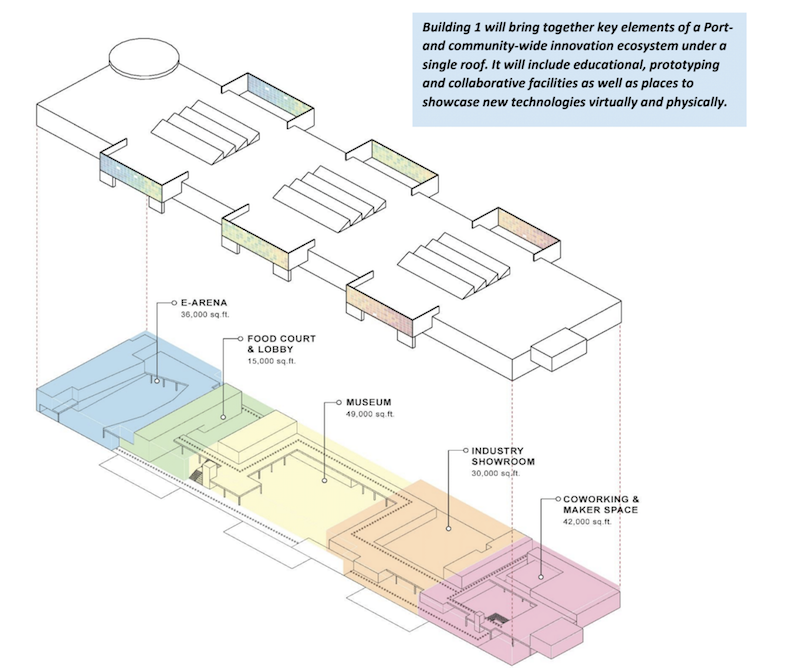
Improvements in one building on campus would add an arena, museum, and coworking space. Image: Port San Antonio
The predevelopment agreement foresees the creation, by 2021, of a 120,000-sf industrial fabrication and laboratory space with about 15,000 sf for open and segmented offices. The remaining, divisible space would offer multiple bays ranging from 20,000 to 50,000 sf. The Port suggests that this building could be located to provide tenants and users with access to the Port’s industrial airport.
The Port plans to pursue the establishment of an “Other Transaction Authority” to facilitate the commercialization of technologies developed through the innovation center and regional innovators, and to provide the government with rapid access to R&D and prototyping.
America Triple I Partners is a New York-based investment advisor focused on infrastructure private equity. Its Chairman and Co-CIO is Henry Cisneros, the former San Antonio mayor who under President Clinton was Secretary of the U.S. Department of Housing and Urban Development He also cofounded CityView, an investment management and development firm dedicated to urban living. American Triple I Partners is affiliated with the investment bank Siebart Cisneros Shank & Co. Its team includes William Thompson, who for eight years was New York City’s Comptroller.
Sundt Infrastructure Development is expected to support the investment group during predevelopment.
Following a 120-day predevelopment period established by the memorandum of understanding, during which additional design and feasibility research will be conducted, the Port and Triple I could formalize separate agreements for phased construction of the two projects.
Related Stories
| Nov 8, 2013
S+T buildings embrace 'no excuses' approach to green labs
Some science-design experts once believed high levels of sustainability would be possible only for low-intensity labs in temperate zones. But recent projects prove otherwise.
| Nov 6, 2013
Energy-efficiency measures paying off for commercial building owners, says BOMA study
The commercial real estate industry’s ongoing focus on energy efficiency has resulted in a downward trend in total operating expenses (3.9 percent drop, on average), according to BOMA's Experience Exchange Report.
| Oct 30, 2013
11 hot BIM/VDC topics for 2013
If you like to geek out on building information modeling and virtual design and construction, you should enjoy this overview of the top BIM/VDC topics.
| Oct 28, 2013
Urban growth doesn’t have to destroy nature—it can work with it
Our collective desire to live in cities has never been stronger. According to the World Health Organization, 60% of the world’s population will live in a city by 2030. As urban populations swell, what people demand from their cities is evolving.
| Oct 18, 2013
Meet the winners of BD+C's $5,000 Vision U40 Competition
Fifteen teams competed last week in the first annual Vision U40 Competition at BD+C's Under 40 Leadership Summit in San Francisco. Here are the five winning teams, including the $3,000 grand prize honorees.
| Oct 18, 2013
Researchers discover tension-fusing properties of metal
When a group of MIT researchers recently discovered that stress can cause metal alloy to fuse rather than break apart, they assumed it must be a mistake. It wasn't. The surprising finding could lead to self-healing materials that repair early damage before it has a chance to spread.
| Oct 7, 2013
10 award-winning metal building projects
The FDNY Fireboat Firehouse in New York and the Cirrus Logic Building in Austin, Texas, are among nine projects named winners of the 2013 Chairman’s Award by the Metal Construction Association for outstanding design and construction.
| Sep 24, 2013
8 grand green roofs (and walls)
A dramatic interior green wall at Drexel University and a massive, 4.4-acre vegetated roof at the Kauffman Performing Arts Center in Kansas City are among the projects honored in the 2013 Green Roof and Wall Awards of Excellence.
| Sep 19, 2013
What we can learn from the world’s greenest buildings
Renowned green building author, Jerry Yudelson, offers five valuable lessons for designers, contractors, and building owners, based on a study of 55 high-performance projects from around the world.
| Sep 19, 2013
6 emerging energy-management glazing technologies
Phase-change materials, electrochromic glass, and building-integrated PVs are among the breakthrough glazing technologies that are taking energy performance to a new level.



